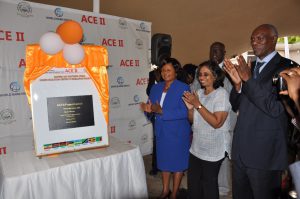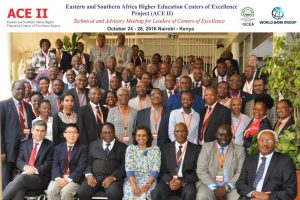Overview
Africa Center of Excellence for Climate Smart Agriculture and Biodiversity Conservation (Climate SABC) at Haramaya University, established with financial support from the World Bank, provides a new opportunity for African students to enroll in a trans-disciplinary post-graduate study conducted by a truly global faculty in the following programs:
- MSc in Climate Smart Agriculture
- MSc in Biodiversity Conservation and Ecosystem Management
- PhD in Climate Smart Agriculture and Biodiversity Conservation
Through this new program, we expect to further advance our educational and research programming in the fields of agriculture and biodiversity to greater heights. The Center is aimed at producing skilled human capital for Africa to tackle challenges posed by climate change through quality post-graduate training and research in partnership with universities across the Eastern and Southern Africa regions as well as with other higher learning institutions in the World. The Center became operational in January 2017.


Inauguration of the African Center of Excellence II at the Inter-Continental Hotel, 24-26 October 2016, Nairobi, Kenya
Partners to be engaged in collaborative training and research programs of the Center include the following:
- Regional peer universities (Makerere University, Sokoine University of Agriculture, Lilongwe University of Agriculture and Natural Resources, Juba University, Gezeira University, Abomey Calavi University).
- National peer universities (Bule Hora University, Hawasa University, Jigjiga University, Jimma University, Maddawalabu University, Mekelle University, Oda Bultum University, Samara University).
- Advanced knowledge centers (Purdue University, Wageningen University and Research Center, Kansas State University, Oklahoma State University, Technical University of Denmark, Copenhagen University).
- National research institutions (Ethiopian Institute of Agricultural Research, Oromia Agricultural Research Institute).
- International research institutions (International Center for Agricultural Research in Dry land Areas [ICARDA], International Livestock Research Institute [ILRI], International Water Management Institute [IWMI], IFPRI, CIMMYT, Regional Universities Forum for Capacity Building in Agriculture [RUFORUM], Association for Strengthening Agricultural Research in Eastern and Central Africa [ASARECA]), and national and international private sectors.
ACE provides a trans-disciplinary post-graduate study conducted by a truly global faculty in the following programs:
- MSc in Climate Smart Agriculture
- MSc in Biodiversity Conservation and Ecosystem Management
- PhD in Climate Smart Agriculture and Biodiversity Conservation
Training will be provided through carefully designed curricula with both coursework and interdisciplinary research supervision provided by faculty from Haramaya University, as well as from other universities in the Eastern and Southern African region and other parts of the world. The Master’s and PhD dissertation research will be guided to focus on generating climate smart agricultural technologies, intensifying agriculture, promoting and enhancing practices of climate smart agriculture, and exploring and enhancing biodiversity for sustainable conservation and utilization. Research topics will address regional priority areas (crop; livestock; soil and water; policy; institutions and innovation; agricultural information and communication; natural risk management; biodiversity and ecosystem management; agricultural and applied economics). In addition, short term training programs will be provided to various stakeholders and partners, including technical staff, students, and faculties from regional, international, and national partners aimed at enhancing the region’s capacity in climate smart agriculture and biodiversity conservation.
Admission Requirements for PhD Program in Climate Smart Agriculture and Biodiversity Conservation
Eligible candidates mainly from African countries are invited to apply for studying in the above-mentioned PhD and MSc programs starting from this date of announcement up to 30 April 2017. The medium of instruction for all three programs will be English. Candidates from countries in the region may apply. Deliberate effort and consideration will be made towards correcting the apparent gender imbalance that exists in professional development at higher educational institutions in the region, and particularly in the agricultural sciences.
1. For male applicants, a cumulative grade point average (GPA) of 3.00 or equivalent at the Master’s level and 2.75 or equivalent at the Bachelor’s level. For female applicants, a cumulative grade point average (GPA) of 3.00 or equivalent at the Master’s level and 2.50 or equivalent at the Bachelor’s level. However, a candidate with good research potential and skills that can be evidenced by scientific publications in peer-reviewed journals can be accepted with lower CGPAs.
2. Applicants must have an MSc degree in fields related to agriculture (plant sciences, animal sciences, agricultural economics, rural development and agricultural extension) and natural resource management (natural resource economics, agro-forestry and forest management, rangeland management, biodiversity conservation and management, soil and water conservation, land resource management and administration, climatology/agro-meteorology, disaster/natural risk management, and other related disciplines).
3. Applicants must submit a research concept note relevant to the PhD degree sought. The concept note should not exceed 2000 words. The concept note should clearly define the research problem, elucidate research done so far to address the problem, identify gaps, justify the research work to be done, formulate clear objectives, methods, and indicate expected outcomes, how the outcome will tackle problems related to climate change in priority area, with annotated references.
4. Applicants should also submit a copy of the abstract of their Master’s thesis as well as copies of their scientific publications.
5. Applicants must pass an interview for admission into the programs (interviews will be conducted via Skype for students from countries other than Ethiopia and in person or via Skype for those in Ethiopia at convenience).
Admission Requirements for Master’s Programs
1. Applicants for MSc in Climate Smart Agriculture must hold a BSc or its equivalent in agricultural and environmental sciences and related fields; applicants from non-agricultural backgrounds may be required to take remedial/bridging courses to compensate for deficiencies as recommended by appropriate academic units.
2. Applicants for MSc Biodiversity Conservation and Ecosystem Management (BCEM) must hold a BSc degree from a recognized university or college in biological and environmental sciences, agricultural sciences, wildlife management and ecotourism, natural resources management, forestry, geography, and related fields.
3. Male applicants must have a minimum Bachelor’s Cumulative Grade Point Average (CGPA) of 3.00 or its equivalent. Female applicants must have a minimum Bachelor’s Cumulative Grade Point Average (CGPA) of 2.50 or its equivalent. However, a candidate with good research potential and skills that can be evidenced by scientific publications in peer-reviewed journals can be accepted with lower CGPAs.
4. Applicants must pass an interview for admission into the programs of their choice (interviews will be conducted via Skype for students from countries other than Ethiopia and in person or via Skype for those in Ethiopia at convenience).
Duration of Study
A maximum duration of four years for completion of the PhD study (one year for course work and three years for research as well as submission and defense of a dissertation).
A maximum duration of two years for completion of the Master’s study (one year for course work and another one year for research as well as submission and defense of a thesis).
Tuition Fees
Self-sponsored PhD students are required to pay a tuition fee amounting to 5500 USD per annum. Self-sponsored MSc students are required to pay a tuition fee amounting to 3000 USD per annum.
Scholarship Modalities and Sponsorship
Scholarship opportunities are available on a competitive basis for eligible male and female students from Eastern and Southern Africa Region (Kenya, Malawi, Tanzania, Rwanda, Burundi, Mozambique, Uganda, and Zambia) as well as for Ethiopian female students. Successful male Ethiopian candidates will be granted financial support to cover research expenses.
As the Center provides only limited scholarship opportunities, qualifying candidates who can fully or partially cover costs of their studies will be given preference for admission.
Applicants eligible for scholarships will receive grants which may include monthly stipends, tuition fees, medical services, book allowances, research funds, and accommodation.
Documents Required for Application
· A cover letter indicating for which program of study the application is being made and description of the motivation to join the program.
· A curriculum vitae (CV)
· Authenticated Master’s and Bachelor’s degrees and transcripts for PhD applicants, and Bachelor’s degrees and transcripts for Master’s applicants.
· Recommendation letters from at least two academic referees who are knowledgeable about the applicant.
· Support letter from employer (if any).
· Copies of valid identification card and/or passport.
· Sponsorship letter from an organization (if any).
· Applicants from countries where English is not the medium of instruction must also prove that they are proficient users of the English language with written evidence from a relevant body or institution in their respective countries.
Where and When to Apply
Applications can be submitted to the following addresses up to 31 May 2017 for the first batch. Applications will be accepted also in the subsequent years.
Applicants must send scanned soft copies of their authenticated degrees and transcripts, CVs, recommendation letters, support letters from employees (if any), valid identification cards, sponsorship letters (if any), and any other requirements listed, in a PDF format as one document (i.e. not in separate files as separate documents). However, PhD research concept notes, copies of MSc thesis abstracts, and publications should be sent in a PDF format as separate documents. The documents should be sent to the following email addresses:
Haramaya University, Office of the registrar:
Mr. Muluken Hussen
Email: registrar@haramaya.edu.et
Or
Dr. Bobe Bedadi, Deputy Center Leader
Email: climatesabcharamayauniv@gmail.com or
bobedadi2009@gmail.com
P.O. Box 138
Dire Dawa
Ethiopia
Tel: +251 255530319
Fax: +251 255530325
Notification of Selection
Selected candidates will be notified by email.
Accommodation
The university will provide self-catering accommodation services to students on the main campus of the university, which hosts the ACE Center.
Professor Nigussie Dechassa (PhD), ACE Center Leader
Email: nigussiedachassa@gmail.com
Dr. Bobe Bedadi (PhD), ACE Deputy Center Leader
Email: bobedadi2009@gmail.com
Dr. Kibebew Kibret (PhD), Dean
College of Agriculture and Environmental Sciences
Email: kibebewkibrett@gmail.com